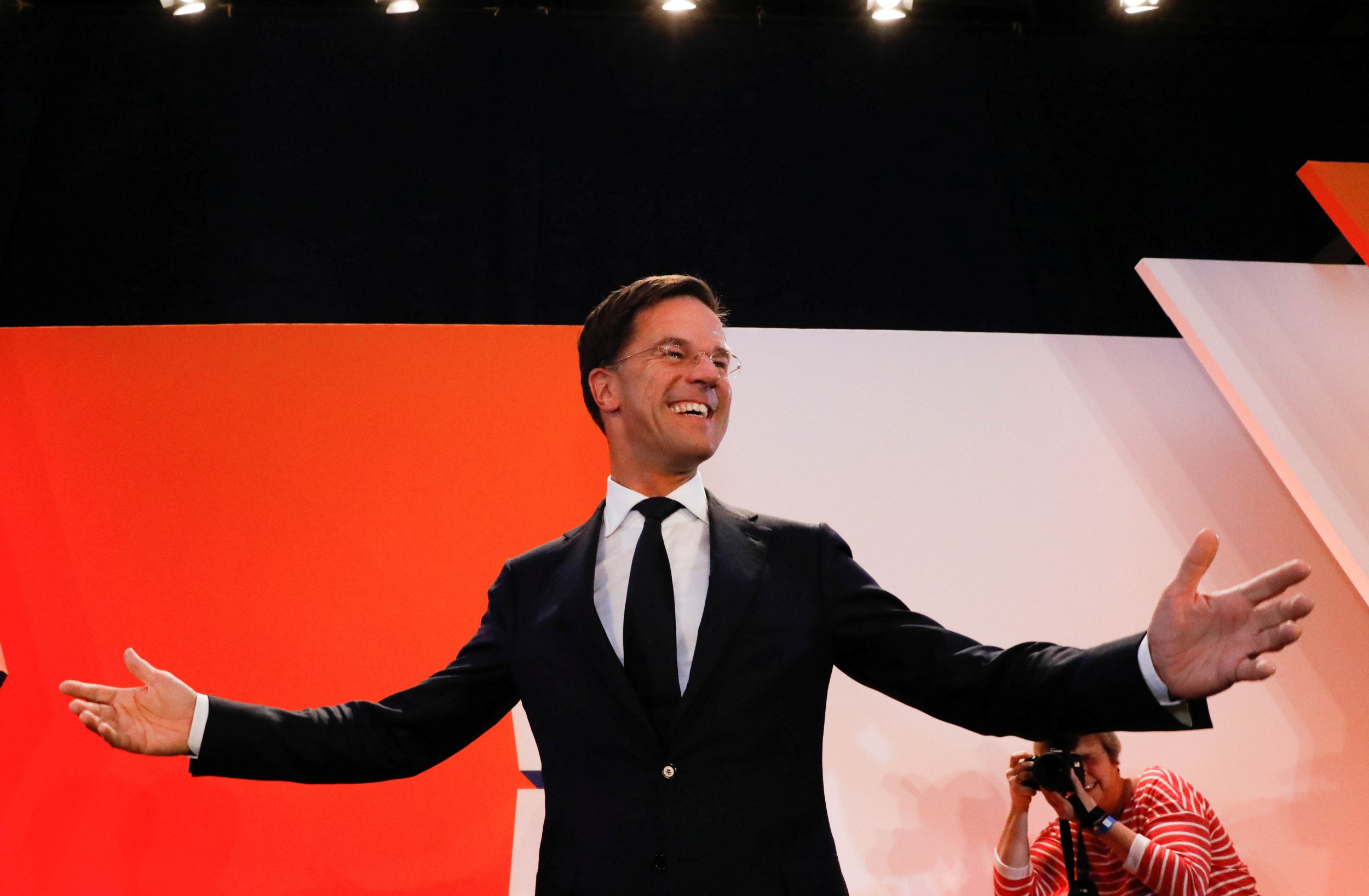
The Netherlands voted on Wednesday in a general election billed as a test of the electoral strength of rising populist parties in Europe.
With the results now in, what do they mean, for the Netherlands, and Europe? Here are five things you need to know:
Geert Wilders didn't win—but neither did centrism
The big international story of the campaign was the rise of Geert Wilders, a far-right anti-Islam politician and leader of the Party for Freedom (PVV).
Though he was polling well and at points even expected to win most votes, in the event, his party followed the same pattern as it did in the 2012 general election and the 2014 European Parliament election and had a disappointing performance on the day. In truth, its gradual polling slide in the lead-up to the vote means that wasn't a surprise.
So was this a victory for centrism or liberalism, as some papers report today? Hardly.
Prime Minister Mark Rutte, whose People's Party for Freedom and Democracy (VVD) came first, sang some of Wilders' tunes during the campaign, taking an increasingly anti-immigrant stance; in January he bought an advert in a paper urging migrants to "be normal or go away." The center-right Christian Democratic Appeal, which came third, had functioned as a sort of "Wilders-lite."
As will be familiar to readers from Denmark or Austria, or those who followed Britain's Brexit referendum and the rise of UKIP, radical right populists don't necessarily have to be in power to get the change they want.
The center-left collapsed
The most dramatic shift in the results was the total collapse of the center-left Labour Party (PvdA). It won just nine seats, down from 29 last time.
This was likely because of a "perfect storm" effect: the party is suffering from the malaise of center-left parties across the continent, while at the same time taking the electoral hit that has become common for junior coalition parties (remember the British Lib Dems?).
Its voters appear to have fled in various directions, but most notably to the environmentalist GreenLeft party, which grew its parliamentary representation by 10 seats to 14.
Which brings us to…
The liberal fightback
While most of the top parties did not take especially liberal positions in the campaign, a sizable minority of Dutch voters turned out to show support for the very opposite of populism.
The GreenLeft party is led by 30-year-old ringlet-haired heartthrob Jesse Klaver. Like France's liberal presidential candidate Emmanuel Macron, his campaign was centered around boisterous, upbeat town hall rally events, and the party says it saw a surge of membership after Donald Trump's U.S. election victory from people fearing a global rise of hard-right tide.
Meanwhile, the progressive liberal D66 party also gave a strong showing; it came joint third with the CDA on 19 seats, and is likely to be part of any governing coalition. Speaking to Newsweek before the vote, D66 spokesman on foreign affairs Sjoerd Sjoerdsma said the party would insist on any coalition it joined governing for "all Dutch people:" immigrants, people of all ethnicities, genders and sexualities.
How the influence of such parties balances out against the pull from the right will be an important battle to watch over the coming months and years.
Turkey drama was good for Rutte
While it's always hard to say how news events impact on elections in their last days, Rutte has been widely praised for his handling of an ongoing diplomatic row with Turkey.
After Turkish President Recep Tayyip Erdogan accused the Netherlands, along with some other European countries, of "Nazi-ism" for banning campaign rallies for a Turkish referendum, Rutte trod a middle ground, standing firm on his position while not escalating his response to Turkey's increasingly virulent attacks.
In so doing, he resisted Wilders' demands for a more extreme reaction.
The significance of the growing migrant vote
While they won't be running the country any time soon, it was a good night for the Netherlands migrant party, Denk, founded in 2015 and largely supported by Dutch Turks. It took three seats.
The party is unusual in the Netherlands, where political movements explicitly based on ethnicity are rare. But Denk's founders, two MPs who left the center-left Labour party, say their party is "the effect of polarisation, not the cause," in the words of leader Tunavun Kuzu in a recent EUObserver interview.
The success of this relatively new party shows that the anti-immigrant rhetoric of the PVV and other parties likely galvanized ethnic minority voters, alongside the ongoing row over Turkish political campaigning.
Uncommon Knowledge
Newsweek is committed to challenging conventional wisdom and finding connections in the search for common ground.
Newsweek is committed to challenging conventional wisdom and finding connections in the search for common ground.
About the writer
Josh is a staff writer covering Europe, including politics, policy, immigration and more.
To read how Newsweek uses AI as a newsroom tool, Click here.








